-
speculative nonfiction
DEI Grieving and AI Skepticism
Tuesday November 21, 2023IYKYK DEI in tech is all but dead. If you’re an outsider, it’s important to understand that employee-led efforts to make workplaces less racist – which began in earnest at the onset of the Obama years – have been steadily blotted out since Trump. The Tech aristocracy has decided to abandon DEI budgets along with other workplace perks. As @betsythemuffin notes (in the thread I’ll be referencing below):
DEI is seen by a sizable chunk of the funder class as an allowable luxury to keep the peons happy.
It has been tragically hard to swallow this defeat. @betsythemuffin again:
Regret that we didn’t do more to build material power when we had the chance.
And yet, as the movement has regrouped and recentered to reposition the struggle, some have begun to take note of a problematic adaptation in the techy left’s rhetoric. @danilo started a thread on Mastodon that points out a new-born form of absolutist skepticism for emerging technologies – notably AI (of course). Regardless of why the left slips into what @glyph calls a problem of “semasiology” around the term “AI”, point is, the hurt seems to be cutting so deep that the movement has retreated into an unproductive preservationism.
The abject and understandably heartbreaking defeat of DEI-type progress in tech has moved most leftist critique of the space into a technological conservatism built on denialist, magical thinking.
You can’t successfully advocate for a dead end when the other side is investing in roads that lead to helpful places.
You can’t win against technologies people find useful by pretending they aren’t useful.
Check out the rest of the conversation. There are smart people in here thinking through this “AI” moment. The underlying question seems to be how we can continue the fight without completely disavowing what might be practical revolutions borne out by this albeit early phase of “AI” that is “finally bearing serious fruit.”
If you’re wondering on what side of the line I fall, my major beef with the LLMs is their wanton extractive consumption of human labor without citation or, god forbid, recompense. Of course, a time honored tradition of slave traders and capitalists. Here is Marc Andreesen with a recent plea written to the US copyright office, hopeful we can just all ignore this blatant theft for the common good of the funder class. This is class warfare:
Imposing the cost of actual or potential copyright liability on the creators of AI models will either kill or significantly hamper their development.
I hold that citation is feminist since it combats the authoritative mansplain that obscures collaboration, hardens selfhood, and hoards ideas. Ergo I consider the de-linkified, referent vacuum of effluvium produced by ChatGPT et al as patriarchal in its presentation of “knowledge” and preoccupation with mastery. I’m scare quoting because philosophically I’m confused about what this content even is, so unhinged. Although I recognize that the interplay of this text with the reader and their investigative context does produce meaning.
UPDATE (minutes after the writing the above): heh, Danilo actually expounds generously about the left’s false critique of AI in a long-form piece on his blog.
-
2170
Monday November 20, 2023From the hunter to the tactical tornado. Man and his-story!
-
poetry
Book review: Event Factory
Wednesday November 15, 2023
I’m not sure how far Gladman’s fantastic Ravickian worlding has spread betond smaller literary, artistic, critical conclaves. She reached me by way of Lucy Ives' article on the “weak novel” (after listening to Ives on a BISR’s podcast paneling the same topic). (I’ve since bought almost every book Ives mentions in this article; I’m on a rapid tour of postmodern anti-novels.)
I’m curious who would fancy this book. I loved it. But I love a good ontological drift through space-time. Are we meant to be reading the artifactual record of the protagonist’s survey? Nope. Maybe? This isn’t the same kind of world-inhabiting, context-laden ethnography that frequents the beginnings of book parts and chapters in sci-fi and fantasy volumes. Well, perhaps it is a long opener as the first of many books.
What feels most real is that Gladman’s text is constantly in question.
Dorothy (the publisher) leaves far too much margin.
The story can hardly get going since getting past “Hello” is nearly impossible. It’s some kind of language issue. But also architectural, since the built world is in some kind of crisis or revolution. Something really bad is happening on Ravicka, and we don’t get enough for a complete analysis. What’s maddening is that the locals seem to brush it off. But it’s not a total wash in the yellow. There are wonderfully concrete and vivid moments of the Ravickian world. It’s not simply abstract for abstract’s fancy. There are stakes here for Gladman. That’s what makes this anti-novel of sorts hard to dismiss. We oscillate between a strong foothold and floatation. Personally I find it seductive-enough.
Is Ravicka even a faraway planet at all? Could other worlds be close, not worlds away?
There are also gestures that feel fresh and exciting, partly because they are given so much room. Is this record incomplete? Were parts intentionally left out? Were they lost? Did they never happen? Sex with strangers. Music is important. Underground civilizations. Dancing is important to speak. Writhing to speak. Unlikely inter-species/cultural collaborations. Going to and waking from sleep. Sleep is important. Obvious love lost, longing. A book that de-centers the written and spoken word, somehow, while concerned with it and the slippage of translation; including awkward encounters with native speakers and their disinterest. Gladman’s person is put through tenderness and saddening separation with every encounter.
This is a small book that you cannot breeze through. But it is pleasure book bound.
Reproduced from Bookwyrm
-
poetry
Book review: The Hospital Ship
Wednesday November 15, 2023
Bax evades a typically satisfying narrative arc for recondite reprints of medical texts and war-time dispatches/memoir peppered among a minor smatter of pro forma obligations to a novel about people surviving large-scale tragedy. But readers should consider this as a book at play with the conventional. Albeit a spirited one. All aboard.
I suspect this is will be either a quick read for you, or you’ll drop it quickly into the gift bin. When the story pokes through the fog of secondary material, you enjoin the nerved doings of hospital staff aboard a large vessel skirting the edge of some broad-spectrum of disaster. The healing process for the ship’s patients, the interpersonal affairs of the staff, an encounter with counter-cultural politicos that attempt to take the ship as a commune.
Aspects of this world on the verge will feel familiar to the overwhelm of our the early 21st century. This makes the Hospital Ship more timeless than not. It’s impossible to determine if the catastrophe(s) are manmade or other, viral, psychological, climate, war, …. A world in crises, multiple, unknowable crises converging – autism in children, mass crucifixions, general depopulation.
Scenes of sex and sexuality are numbered in this book. The fleshiness, cigarette smoking, feels well-situated to the 70s. Some second wave feminism woven through; although I felt it was oddly (perhaps lazily) retrofitted in the form of Sheila’s brief, monochromatic biography. Kinda shoved in there. I’m not convinced Bax was pushing the subject of women’s lib radically, at least any more radically than mainstream Leftism of the time. But maybe that’s part of the play – what is the correct rousing politics in the face of amorphous, multi-faced threat.
The fleshiness ages ok, although a bit trite and verging on cringey because the character perspective is always cis-dude. Was the narration of a Vietnamese prostitute healing, with literal sex, a former Wall St. banker stuck in a psychological malaise a refreshing take? prosaic? satire? for the times? I’m not enough of a comp lit scholar to understand the context. How, Euan, the main character, erratically responds to the process of intimacy and sex working it’s magic is fun. Especially as the book explores his difficulty with achieving lasting, satisfying sex and love with Sheila.
Overall enough intrigue as an example of early postmodern sci-fi, still-relevant themes, certainly a romp of prose. But not for everyone, I suppose.
Reproduced from Bookwyrm
-
poetry
Collected turns of phrase
Monday November 13, 2023“wish embroidering” - Eugene Lim, Dear Cyborgs
“the air quicken before rain” - Robert Glück, Margery Kempe
“His ears and tongue felt carbonated” - Samuel Delaney, Troble on Triton
-
poetry
Saturday November 11, 2023I watched Eastern Promises last night and this morning
And Donnie Brasco
And The Departed
Before -
speculative nonfiction
Lament for Tafteria: sailing the Apollo's docs
Saturday November 11, 2023
Documentation, naming things. Hard. Let’s see this hardness compound at the intersection of these two phenomena in the real world.
I’m casually scanning the Apollo docs, reading up on subscriptions because my wife is writing graphql client code at work. (I had vague memories of how we worked with distributed event streaming at my last job. NestJS + Kafka. We had consolidated apis into a graphql layer, but worked with Kafka event streams through Nest with the
kafka-jslib as a bridge. Point is, I wanted a light refreshment of how this stuff works.).It’s a frustrating moment to jump between these two pieces of the documentation. (This is supposed to be a mature framework (sobbing, why can’t we have nice things)). From 2. Initialize a GraphQLWsLink to Enabling subscriptions.
The former section, which walks us through client setup, provides a callout with a detour into the server docs for grabbing the connection url we need for configuring and instantiating our web socket linkage.
Replace the value of the url option with your GraphQL server’s subscription-specific WebSocket endpoint. If you’re using Apollo Server, see Setting a subscription endpoint.
If we are using Apollo’s server, then we must pass a
urlproperty when creating and instantiating theGraphQLWsLinkobject .const wsLink = new GraphQLWsLink(createClient({ url: 'ws://localhost:4000/subscriptions', }));HOWEVER, once we hyperlink to the server docs one simply cannot find – throughout the entire web document – a mention of “endpoint.” We’re dropped into a section called “Enabliing subscriptions” – instruction for setting up the server side bits.
Let down. Expectations missed. Problematic asymmetry, lack of consistency!
Repletely kerfuffled, my synapses delivering a reminiscence of Tom Benner’s big bird bound Naming Things, and his chapter on Consistency. (This so happens to be one of my favorite dogmas of Better Naming™️.) Well, the Apollo docs demonstrate a similar symptom of bad naming, just like the kinds of bad examples we oft find in code. Join me in considering disparate, hyperlinked documents as analogs to components of a software program that exchange messages. Readers of these texts suffer the bad naming with familiar symptoms: frustration. Capitalists lose the most with anemic productivity.
If the hyperlink is a documentation document-as-component api/interface, us readers should be allowed to charismatically move back and forth without being flung out from our flow state like starships intercepted in warp. Perhaps the doc could send me to a subsection of “Enabling Subscriptions” titled/anchored with “Server endpoint” (or the like). My instinct is that there’s a deeper scoop here.
Of course, there’s an imperfect system to blame. When Trevor Scheer removed all mention of “endpoint” in the docs update preparing users for Apollo Server version 3 back in 2021 – Apollo Server would no longer include inherent support for websocket protocols – how closely did he collaborate with Stephen Barlow who initially committed the instructions referencing endpoints a year or so before. Do the people matter? (They do.) And from under whatever constraints they perform these literary efforts. We can wonder, imagine, daydream about the socio-technical system that produces docs for clients and servers, and how the basic capabilities of the web link them together. The bounded contexts. The challenges of producing universal languages, ubiquitous terms across what likely are two disparate teams.
There are some leaky abstractions, but it’s not a total system failure.
I’m reading Bax.
Dispatches, bulletins, papers, pinned up, spewed about The Hospital Ship.
Page 15: A chronic shortage of pins to fix up the reports, so that in consequence they blrew away and anyone in the stern of the ship could reach out a hand and collect bulletins from the air as they drifted by in an endless paper-chase over the stern of the boat and on into the sea.
Page 98: Did the programmers hope to attract some reply? The
Hopefuldid not know what replay to make so they transmitted their call signal only, but there was no response.Euan wants to blame Tafteria, too bad.
-
2170
My soft animal body in the family of things
Friday November 10, 2023Passing along this Mary Oliver poem shared by Nate Mullen last week at the Metaspore Symposium in San Francisco. One his of white lady heroes. It’s the least my soft animal body in the family of things can do.
You do not have to be good. You do not have to walk on your knees for a hundred miles through the desert repenting. You only have to let the soft animal of your body love what it loves. Tell me about despair, yours, and I will tell you mine. Meanwhile the world goes on. Meanwhile the sun and the clear pebbles of the rain are moving across the landscapes, over the prairies and the deep trees, the mountains and the rivers. Meanwhile the wild geese, high in the clean blue air, are heading home again. Whoever you are, no matter how lonely, the world offers itself to your imagination, calls to you like the wild geese, harsh and exciting - over and over announcing your place in the family of things. -
poetry
City Pop (Vibes) Immaculate Delusions
Saturday November 4, 2023
It’s a bizarre aesthetic (and rhetorical) leap from Richard Mayhew’s Delusions to the similar strong chromas, hues, and deep values of Japanese City Pop album art. But how many colors are there in the world. Every visit to SFMOMA I drift to Mayhew. Into his drives, spirals, through landscape that “reclaims the wilderness for the dispossessed” for indigenous and Black planetary citizens, family. Paint over the prospector. Disrupted manifest linerality, letting the land announce itself. It’s wild how this painting ushers your gaze forward and back.
But onward to Just Enough™️ aesthetic relativity for my mental leap and a drift through space-time.












-
poetry
Jazz Vol. 1
Thursday November 2, 2023
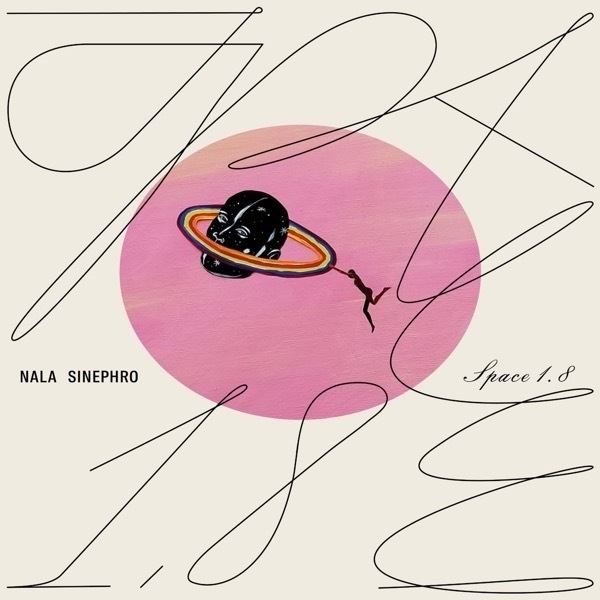


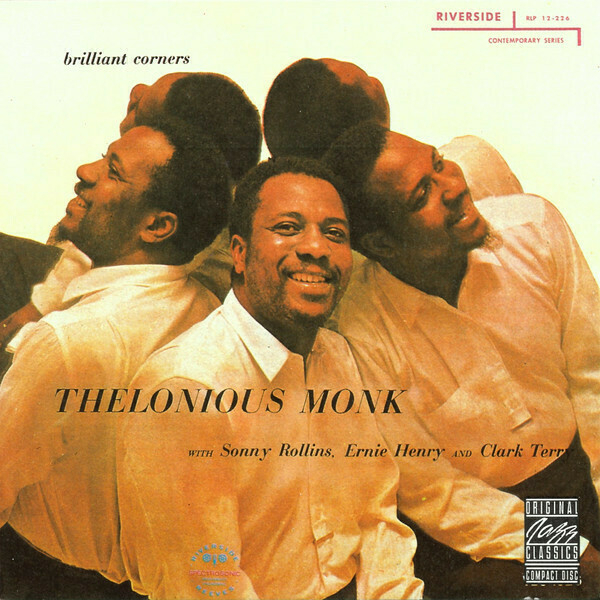
-
speculative nonfiction
Closure was small, TypeScript is big (thinking w/ Dan Vanderkam)
Wednesday November 1, 2023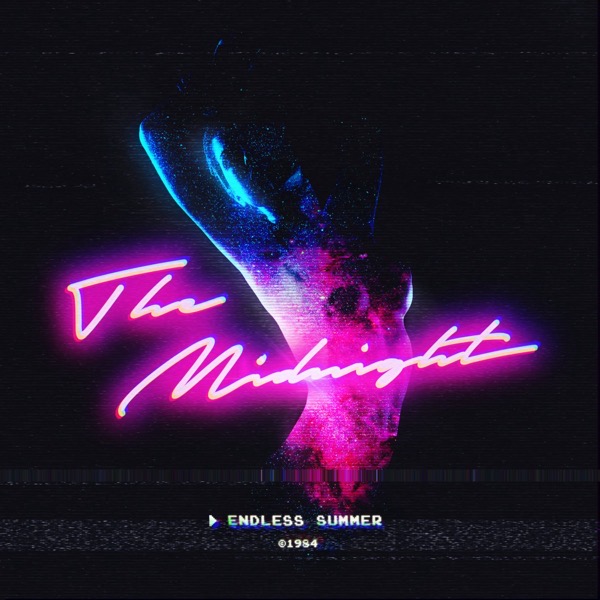
The dangers of premature optimization are well understood among software engineers who’ve been frustrated when the secondary effects of the efforts end up compounding maintenance cost. (Does this principle play out in other milieu?). What’s perhaps more interesting to ponder is when “advanced optimizations” are decidedly beneficial but cannot be implemented because of larger system and social dynamics that require greater interop. Here I’m thinking with Dan Vanderkam’s post from back in Sept The Saga of the Closure Compiler, and Why TypeScript Won.
Dan skips gingerly back through recent web/computing history to discuss the (obvious in 20/20) demise of Google’s Closure compiler. The hardware of the early aughts demanded Closure’s designers focus on minification. In contrast, if the typed project(s) (TypeScript) of today are going to succeed beyond niche usage, they must play well with an expansive ecosystem of <other people’s code (le sigh!) which might not be typed. Despite the heroic campaigns of developers to slap types on their everythings (
DefinitelyTyped), the JavaScript universe offers no gaurantees to makes of tools. TypeScripts declared horizon ofBe a cross-platform development tool
must be joined by
Emit clean, idiomatic, recognizable JavaScript code
and further qualified by the non-goal of
Aggressively optimize the runtime performance of programs. Instead, emit idiomatic JavaScript code that plays well with the performance characteristics of runtime platforms.
I wonder how many TypeScript developers have looked at the TypeScript Design Goals? Not to call out/in, just curious.
I wonder, the Midnight’s 2016 Endless Summer. Saxophone crying out from the other room.
-
speculative nonfiction
Language ergonomic studies: Possession: Ruby, JavaScript, D/s, Mycology
Tuesday October 31, 2023
There exist happy little clouds of coincidence when studying new languages. And not just across the computer ones, mind you!
Ruby and Indonesian share a frugal brevity and disinterest in flairs of punctuation when managing possession.
Itu bukuku.vs
That's my book.And…
me = Person.find(my_user_id) my_books = me.booksvs
const me = await prisma.user.findUnique({ where: { id: 99, }, include: { books: true } }); myBooks = me.books;Well, Rails AR query syntax vs Prisma (NodeJS). (Also, did I do a useful interpretation of linguistic possession in a soft coding expression??)
This isn’t YAOFJS (Yet Another Opprobrium for JS). I don’t have a quarrel with English, either. Although I find it often fairly dull when it’s not rescued by the reticulations of regional and immigrant (forced or free) anastomosis of the tongue and mouth (and whatever other maneuvers contribut to nudging the Queen’s own verbage (I’ve forgotten if there is anything before a body without organs, how is it done???)) that take root in everyday speech.
Only a mere 30 pages (of 250) into Make the Golf Course a Public Sex Forest and you run headlong into Raechel Anne Jolie’s musings on D/s, mushrooms, and mouths. There’s probably something here to dwell on with respect to power, colonialism, oral sex, entangelment, Dulcinea Pitagora’s “subspace” in BDSM play (ohhh, wonderful that this term wasn’t entirely pre-figured by Roddenberry’s universe expanse), etc…
Cue Butler’s Xenogenesis, ringing in my ears.
-
poetry
Friday October 27, 2023What other optimisms lie in wait on the Enterprise NCC-1701-D?
-
speculative nonfiction
Language ergonomic studies: Ruby vs JS one-liners
Thursday October 26, 2023Coming from JavaScript, I was not expecting Ruby’s
Enumerablemodule to have methods for selectingminandmaxvalues from a collection. Especially with an added parameter that lets you “take” a range starting from zero.For comparison, what if we needed the lowest
xnumber of values from an array of numbers.In JavaScript we’d sort numerically (requiring the conspicuous umbrage a declaring for the umpteenth time a comparison function) and then destructuring out the result.
function twoLowest(numbers) { return numbers .sort((a, b) => a - b) .slice(0, 2) .reduce((a, b) => a + b, 0); }Anyway, written in 10 days.
Matz giving us many ways to do things.
I want to make Ruby users free. I want to give them the freedom to choose. People are different.
From:
🔗 The Philosophy of Ruby: A Conversation with Yukihiro Matsumoto, Part I
def two_lowest(numbers) numbers.min(2).sum endEnumerable methods that can receive an operator as symbol. Glacial autumn breeze whipped up from the 101. I don’t have a brevity fetish, like I know many of you do. Or the tendency to place the one-liner upon the highest of pedestal. It’s the obvious natural-language-style readability of the Ruby here that is simply remarkable.
Achieving this is possible in JavaScript with more fanfare. But, alas, the maintenance cost of dressing up our array in Ruby’s fast casual couture.
class NumberArray { constructor(numbers) { this.value = numbers; } min(n) { function compareNumbers(a, b) { return a - b } this.value = this.value.sort(compareNumbers).slice(0, n); return this; } sum() { function add(a, b) { return a + b } return this.value.reduce(add, 0); } } function twoLowest(numbers) { return new NumberArray(numbers).min(2).sum(); } -
speculative nonfiction
Rspec vs js, let vs let
Thursday October 26, 2023I love comparison pieces like Steve Hicks' article What JavaScript Tests Could Learn From RSpec that juxtapose the syntaxes, rules, shibboleths of two programming languages. Comprehension comes more quickly.
Interesting. In describing the perceived advantages of rspec’s
letmethod to declutter code, I noticed Hicks fails to mention this little maneuver he performs of encapsulating aresultfunction –resultandgetResultfor rubes and javs respectively. It would seem this strategy is a given for him. But in my experience it’s one I’ve shied away from in JavaScript tests – especially any of non-trivial sophistication.I prefer the subject invocation repeated in each
itblock. I find this repetition comforting. Like:describe("when the first value is negative", () => { describe("when the second value is negative", () => { it("returns a positive number", () => { const second = -3; const result = calculator.multiply(first, second) expect(result).toEqual(3) }) }) describe("when the second value is positive", () => { it("returns a negative number", () => { const second = 3; const result = calculator.multiply(first, second) expect(result).toEqual(-3) }) }) })Also, unlike what I’m doing above, Hicks is declaring the value of
secondinbeforeEachblocks to hint at how more sophisticated JS tests would be written with heavier logic to execute before one or more test runs within the same scenario/context. In practice I find you often do both in JS tests – do preparation inbefore*blocks and declare single-use constants withinitblocks (vs re-assigning/re-using).Generally I keep re-assigning/re-using variables to a minimum if they can be localized – it is confusing to follow in JS. Beware of cross-contamination. Pollination. Sex.
But why: for some reason the concise syntax of let seems easier to track. Lack of curly braces?
This doesn’t really bother me though:
let sharedVar; before(() => { sharedVar = ... }) describe(() => { it(() => { sharedVar = ... }) })Is rspec
letbetter than JSlet? Of course of course, it depends. le sighEven rspec maintainers caution us, as Hicks notes. Convenience always carries a caveat in programming. This is a substantial pillar of the “readability” discussion: durability of convenience.
Note: let can enhance readability when used sparingly (1,2, or maybe 3 declarations) in any given example group, but that can quickly degrade with overuse. YMMV.
Cool find: givens. Shoutout to the translators, the transcribers, the interpreters.
-
2170
Thursday October 26, 2023Excerpt from Decision Making in Brainless Organisms by Raechel Anne Jolie from collection Make the Golf Course a Public Sex Forests
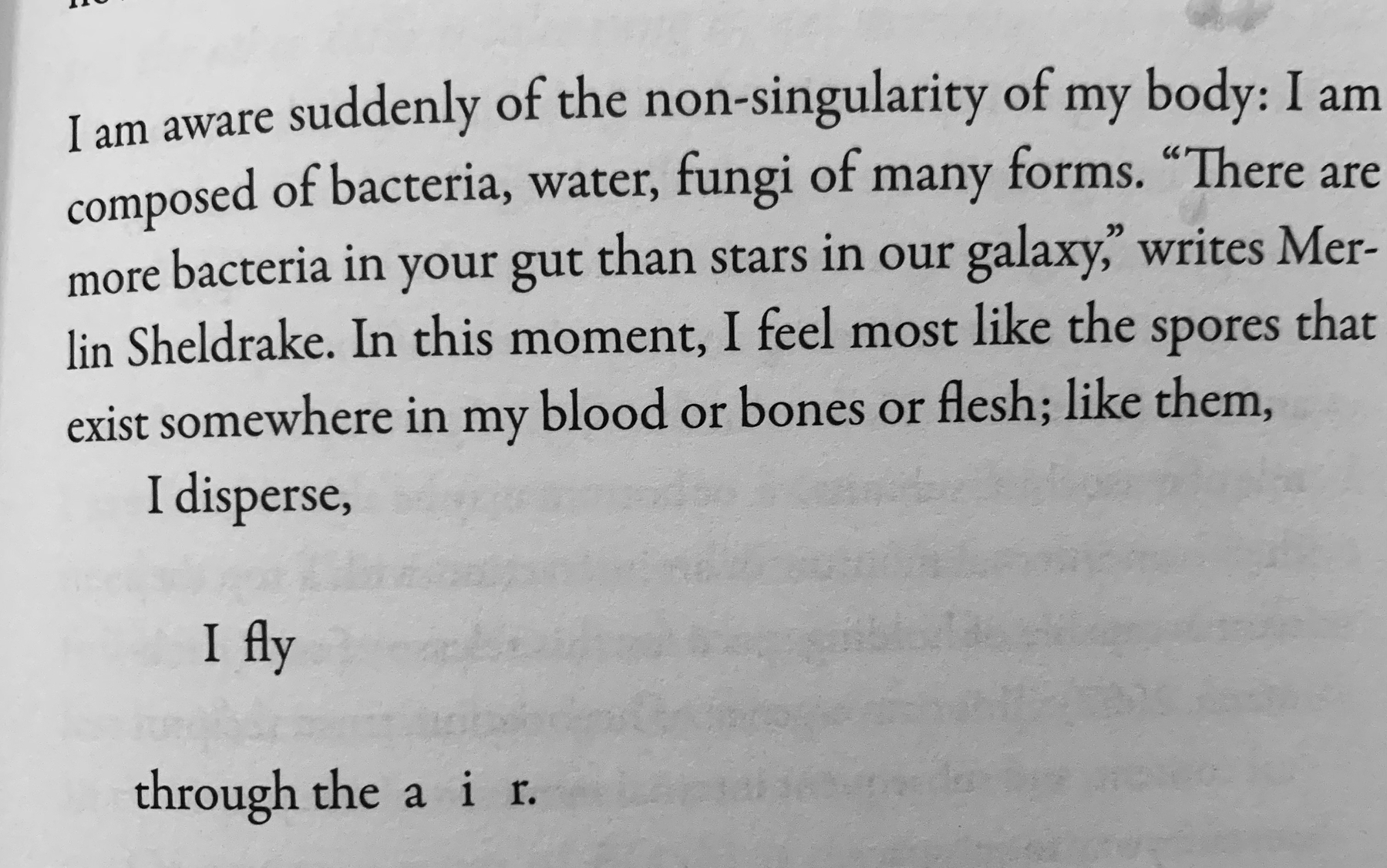
-
poetry
Thursday October 26, 2023Just discovered Sun Ra’s recording at Haverford College, 1980. The story of this record is bonkers.
Students running concert series book jazz after previous acts flop - the Talking Heads! (Elvis Costello was also booked but cancelled after said flop) 🤦.
Ra appears suddenly after cancelling two weeks prior. The only available piano is an electric Fender Rhodes. Ra fiddles around on the spot backstage.
Resulting performance is mesmerizing, chill, masterful.
#sunra
-
poetry
Abolish The Family by Sophie Lewis
Friday July 14, 2023But uh oh those summer nights. Right on the heels of a transformative family weekend! When Theo laughs, the world is a single flower. What is your family’s pronoun? Are the flower and Theo the same or different?
-
speculative nonfiction
With Anne-Marie Willis, professor of design theory at the German University in Cairo.
Wednesday July 5, 2023Another world is possible. But what of worlding? How to world?
When a Farley’s barista is a strong current; wow the level of shine escaping her mouth. And I loved it. The slightest tickle of maple syrup was a great recommendation!
Per usual I sent myself something to read and didn’t cite the source so I’ve been having that weird kind of drifty, but tethered, Pong ball experience. Was it mentioned by someone in a Paper in Systems discussion? Maybe a content of the fediverse’s systems thinkers briefly held in place by my thumb.
As I like to say (with often different verses), I do software development because it’s a phenomenological wonder of people, text, code, time travel, non-determinism – and always pluckily avoids fitting neatly into capitalist fetish.
Like, software projects (already “bad” (incomplete, inaccurate) lexicon) of any substantial scope are only delivered on time accidentally.
Frederica Frabetti supports this axiomatic chiste of software, noting in her book Software Theory:
“The central problem of software development is thus the impossibility of following a sure path in which a system is completely and exhaustively specified before it can be realized.”
and
“Stability is something that happens to the system, rather than being scheduled and worked towards.”
Look how software was virtually helpless to build complex systems that are designed to become eventually consistent.
For me, software is philosophical-ing. An ontological milieu. Therefore Willis' essay is soooo good for those of us who are philosophical-ing, but not academically trained – and who can drift into this kind of theoretical reasoning easily, especially in an essay like Ontological Designing which onboards us you into hardcore theory with a ton of grace. Willis doesn’t need to spend her initial breaths on defining “ontological” and and Heidegger’s “being”, and (re)introducing us to the failure of the Western metaphysical tradition. But she is generous; and that’s likely the point. A broader appeal.
Which, in turn, helps the mind Pong around during an essay about pervasive push and pull.
I’m reading this essay about how we effect social change but also thinking through the systems reasoning and how it vibrates into software ontology. Well, there are references to IT infrastructure and other “equipment” of our present epoch – though they do not supersede other kinds of equipment. For Willis, our contemporary technologies can function both as examples of any designed material, as well as juxtapose with the immaterial (organizational structures, administrative systems, etc…) to demonstrate how they are equivalent as objects/outcomes of the ontological design circularity/looping, bi-directional reach – Heidegger’s grabbing Cartesian dualism by the shoulders and shaking them. (“Ontological designing refuses such one dimensional understandings of (human) being-in-the-world, which are worn-out fragments of enlightenment thinking and Christian morality sloppily stitched together.") As Willis notes, Heidegger themself reaches for the simple household jug to work with in his pursuit of how things, thing.
“The jug gathers and unites these.”
These being: water, wine, sky, earth. Gathered/outpoured.
But she talks about tech in a way that tickles, for sure. Especially it’s excess as it frenetically infinite loops rather than unlocks potential:
Rather than inducing us into a world of multiple creative possibilities (as software advertisers would have it), [computers] design us as users into their horizons of possibility – which by the very nature of horizons (in Gadamer’s sense) always have a limit. In fact, the proliferation of options within even a basic operating system or software application becomes a tyranny of choice, a maze of seemingly endless possibilities, a dazzling instrumentation for its own sake, all means with no end in sight.”
Maybe free software never will be truly free.

-
speculative nonfiction
Naur, goodies, 1985 years after Jesus Christ
Friday June 9, 2023There are so many goodies in Naur, 1985. Filter, some():
- Declares there’s no right way to write software
- (Further) rebukes the scientific method
- Calls out lack of empirical study of software methods
- The programmer as “manager” of computer activity
Thank you ceejbot for further distillations.
-
speculative nonfiction
Naur, the optimist, 1985 years after Jesus Christ
Friday June 9, 2023The year is 1985. Certain kinds of optimism abound in programming circles. From Peter Naur’s Programming as Theory Building:
"It may be noted that the need for revival of an entirely dead program probably will rarely arise, since it is hardly conceivable that the revival would be assigned to new programmers without at least some knowledge of the theory had by the original team."
The infamous “shit mouse” bug that I pushed to production in 2018 – which subsequently became an iconic team joke with its own concomitant laptop sticker swag – was the direct result of software abandoned in the wake of absconding team members. Picking up dust-laden software seems like a common occurrence these days, no?
In their reading-with of Naur, Ceejbot offers a valuable remediation technique for deleterious knowledge vacancies. It’s one that I personally strive for in everyday software practice: gross amounts of maintainer documentation.
Don’t waste time documenting what can be seen through simple reading. Document why that function exists and what purpose it serves in the software. When might I call it? Does it have side effects? Is there anything important about the inputs and outputs that I might not be able to deduce by reading the source of the function? All of those things are clues about the thinking of the original author of the function that can help their successor figure out what that author’s theory of the program was.
and
…the program exists to solve a problem, some “affair of the world” that Naur refers to. What was that problem? Is there a concise statement of that problem anywhere? What approach did you take to solving that problem statement? What tradeoffs did you make and why? What values did you hold as you made those tradeoffs? Why did you organize the source code in that particular way? What belongs where?
-
speculative nonfiction
Power Moves
Tuesday June 6, 2023During her novel workshop on estate planning, Sarah Deluca of Move Money Shift Power poses the question:
Is holding onto control after your death something you want?
If part of our life’s work is to strengthen connection, relinquish power, share power, redistribute, does a Trust actually violate the moves we’ve been making at the speed of small “t” trust? Individualistic posthumous scheming is not the invention of communities, but of corrupted powerfuls. It would seem.
A few days later I found myself in the next Paper in Systems discussion led by Dawn Ahukanna and Shauna Gordon-McKeon. On the table was Shauna’s essay Interpretive Labor: Bridging the Gap Between Map and Territory. Wherein you’ll find a rich investigation – and then interrogation – of the lopsided power distribution between those that labor to imagine, construct models, maps, and those that sit with the effects of the implementation – who interpret, navigate, bridge the chasm between theory and material outcomes.
I was called in. Software engineers do wield an outsized power from behind the desk. Although the tower isn’t deathly bleached, because 1) we do some interpretive labor at the seam between business requirements and software building (system design, theory of, code/text writing), and 2) failures reverberate back to us pretty hard (midnight pages) – at least more acutely than through the beauracratic layers. (Do the capitalists get to feel much of anything?) Nonetheless, we probably aren’t the ones screaming during the scream test. What do we do with this power?
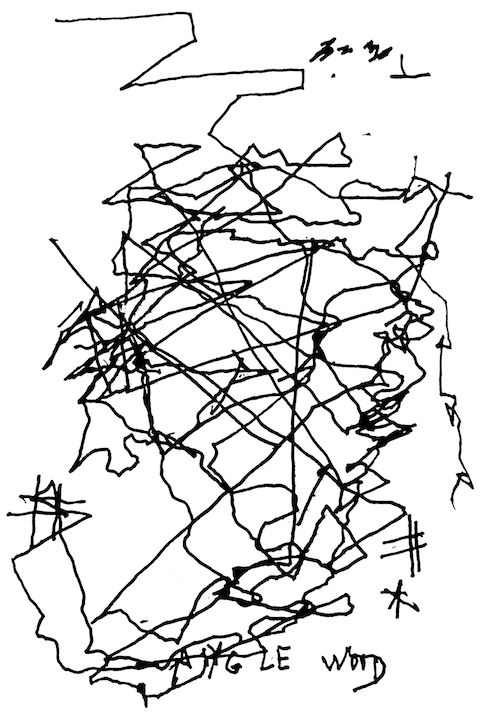
Jorge Luis Borges - Self Portrait -
speculative nonfiction
Can you jam with the console cowboys in cyberspace?
Sunday April 30, 2023No. You can’t. Not yet.
It’s quite possible that my work in computers today is a last ditch to actualize a childhood fantasy of solving neighborhood crimes with my friends in Brooklyn with the help of a friendly ghost that communicates via word processor. You type, then we type, Ghostwriter.
The way she caresses the monitor in this scene: longingly, tenderly, expectant. The arrogant gush of buzzwords. Unalloyed after school cool.

-
poetry
Thursday February 16, 2023The other day I played the dérive along Valencia after a salad with a colossal heft of blue cheese. I found my way to Dog Eared Books. I always end up there. However, this time I grazed through atypical sections; like the politically charged cabinet below the register with the latest thunder for white supremacy; the sale rack; a quick glance for sci-fi, but nothing more this time.
Under philosophy I found Han’s Burnout Society. These pocket-sized books are almost irresistible for the busy post-modern man. Give me all the deep thoughts in the space between meetings. Be my vade mecum while I traverse the network.
Well, apropos.
Over the weekend Taylor whisked me off to the Botanical Gardens to see the magnolia blooms. It was in the context of that blooming that I unfolded Han’s slice of philosophy under the redwood grove canopy. The tree bath reworking my nervous system.
So very apropos as I’m diving into the book and having a meta moment reflecting on what Han calls an “excess positivity,” a “neuronal power,” “violence,” “Same.” (Baudrillard is invited.) A new category of oppression in our post immunological world that has supplanted the viral. Is this my contemporary affliction; why I get the Sunday Scaries? Loss of boredom, as Han goes on to claim. The human is animal again, too busy multitasking to survive the onslaught of information, activity, to find steady ground, to manage and also smile through the (filthy, positive) filter…
This strange new world where “Big Data never forgets anything at all” – from Psychopolitics: Neoliberalism and the New Technologies of Power, then from Mackenzie Wark’s Verso piece; more on that later).
The “outsourcing of memory to technics” (Wark again).
Big Data’s promise forcing us into a new relationship with anything. Be like Big Data. Be in the frenetic stream.
And I’m only like 15 pages in.
Taylor comes over and interrupts my Hanish stupor. She recounts a moment just before where a middle-aged couple snapping photos of [which bird?] with telephoto lenses were acting very nonplus. They said (some version of): “it’s not remarkable, he’s always here.” Were they bored? Rather, were they bored enough? What was this small-talk play-acting wrenched out? Why were they so disappointed by this encounter? I’m imagining Donna Haraway sighing at the missed opportunity here to mix, to mingle, to get messy across species. Not shocked, though, like she felt toward Derrida’s failure:
Derrida failed a simple obligation of companion species; he did not become curious about what the cat might actually be doing, feeling, thinking, or perhaps making available to him in looking back at him that morning…
What happened that morning was, to me, shocking because of what know this philosopher can do. Incurious, he missed a possible invitation, a possible introduction to other-worlding.
He couldn’t cross the Great Divide between culture (human) and nature (animals, etc…). Did our photographers similarly fail? Does this couple’s mastery of photogenic capture leave them also captured, immobile, behind the (reaching, never arriving) lens? The speed of their automatic shutters; the hyperattention, the multitudes of frames they produce, threaded into the positivity stream; it has exhausted them. Are their semi-automatic shutters warring survivalism of cacophony to the birds' own musicircus. Riffing (rifling along): capture without contemplation. Does this couple ever breathe into a contemplation of the being at the other end of the lens? Dropping into a contemplation that might lead to an inter-mingling. An invitation.
The irony, too, of the lush saturation of plants. Was that weighing on them, as well? “He’s always there.”
But maybe…fuck Han? I so appreciate you Mackenzie Wark. I can’t remember what I typed, but Google led me to Wark’s piece on Han from 2019: Byung-Chul Han: Shanzhai Theory. The Burnout Society is not explicitly mentioned. In fact, the piece seems to read through Psychopolitics: Neoliberalism and the New Technologies of Power despite the title referencing another of Han’s books. I’m not sure, the notes counting/referencing is a bit confusing.
I’m glad I found the article. Han’s terseness, density, and improbable accessibility, carries a seductive authority. Wark sets up their opposition to Han at the start of the piece, before juicier bits later:
The success and limitation of Han’s writing is that it universalizes the experiences of people like me, what I call the hacker class: people whose job is making new information.
Ah, maybe Han’s collecting up of “human beings” and this time, age, period of history or whatever is actually a simplistic contour around a privileged class. This hacker class, who are sneakily conscripted into this contemporary capitalist stream to produce new information. What’s more, Wark finds in Han a nostalgia for Foucauldian disciplinary society. Or more, a discreet Sovereignty to control, constrain, restrain, silence speech. Hard boundaries (feels masculine). Geographical. Not a confusing dilution of “social media shitstorms,” “flattened hierarchies.” Wark goes on to level a barb at Han for parading into media theory too clumsily. He makes amateur mistakes, psyched himself out by his own fears of Big Data and loss of solid ground:
Like many amateurs who stray into media theory, Han mistakes surface appearances for forms. Effects are taken as given and routed through permutations on concepts from the philosophical canon. It is simply not the case that social media is a world without intermediaries or unilateral forms of communication and control, as Alex Galloway demonstrated long ago with his study of protocol. Its networks are distributed but protocol can still be non-reciprocal.
Right, like is it all a messy soup? And from an optimistic POV: What about the very real power flip in social media spaces? Influence achieved without financial power. What about Black Twitter’s new protocol?
-
poetry
Friday December 2, 2022Bringing back sweet memories. Atmospheric pressure. La lluvia frames colored paint.
The real miracle is how long Chevron kept the oil burning. Rise Judea.
Upcycled hellenism is my streetwear idolatry. Labneh and cacao soda; another probiotic day with a credit score!
